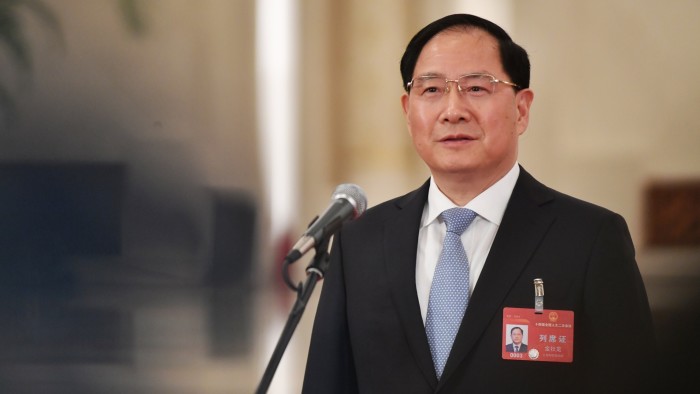Stay informed with free updates
Simply sign up to the Chinese politics & policy myFT Digest — delivered directly to your inbox.
China’s technology minister, who played a central role in the country’s push to become a tech superpower, has been removed from office after being out of the public eye for two months.
Jin Zhuanglong has been absent from important government gatherings since the end of December, the ministry’s public records and a Financial Times review of the meetings show.
China on Friday evening announced that he had been removed from his post and replaced by Li Lecheng. The FT had earlier requested comment from Chinese authorities on Jin’s extended absence.
Jin previously held meetings, spoke at conferences or toured with premier Li Qiang, China’s second-highest official, almost every other day, according to the ministry’s records.
There may be personal or other explanations for Jin’s absence from public view. But extended, unexplained disappearances by Chinese officials have historically indicated an anti-corruption investigation.
Four people familiar with the matter said they believed Jin was the subject of a graft-related probe.
Jin would be the latest incumbent cabinet member ensnared in Xi Jinping’s relentless anti-corruption and discipline crusade since the president’s third term began in 2023. The ministers of defence, agriculture and foreign affairs have all been replaced.
While Xi has called for continual self-policing to maintain the ruling Communist party’s survival, experts and business leaders have privately complained that the anti-corruption drive has sown fear in the country’s bureaucracy and paralysed decision making.
China’s anti-graft watchdog disciplined 889,000 officials last year, up 46 per cent from the year before and the most in at least a decade.
Yeling Tan, a professor at Oxford university’s Blavatnik School of Government, said the anti-corruption campaign had unintended consequences for policymaking. “The focus on party discipline and party loyalty has sent a chill through the system and led to risk aversion,” she said. “It is safer to not be proactive.”
Xi’s ambitions to reshape China’s economy around advanced technology has raised the tech and industry ministry’s stature in recent years. The department oversees Chinese industrial policy, including development of artificial intelligence, semiconductors, telecommunications and electric vehicles.
Last year, Jin and Li visited top semiconductor groups such as Naura and YMTC, which Beijing is counting on to overcome the western chip embargo, as well as laser maker HGTech and a quantum computing research centre.
Jin rose to prominence during a five-year stint as chair of state aircraft maker Comac, where he was credited with steering the development of the C919, China’s first domestically produced passenger jet.
From there, he was promoted to deputy director of China’s central military-civil fusion office before being elevated to industry and tech minister in 2022 following his predecessor Xiao Yaqing’s removal over an anti-corruption probe.
The last public event on Jun’s schedule was on December 27, when he led a meeting praising Xi’s new industrialisation ethos. An FT review of videos and government statements confirmed that Jin was absent from subsequent events, with deputies often filling his role.
In early January, Jin missed a meeting of top officials where Xi emphasised corruption as the “biggest threat” to the party.
On February 5, he missed a meeting of the State Council, or cabinet, to prepare a report on China’s upcoming economic growth targets and policy priorities.
Aside from foreign minister Wang Yi, who was receiving foreign dignitaries, Jin was the only minister absent from that meeting.
On Tuesday, Jin’s place in Li’s retinue on a visit to research centres under China’s state-backed telecom groups was filled by deputy minister Xin Guobin.
Read the full article here




